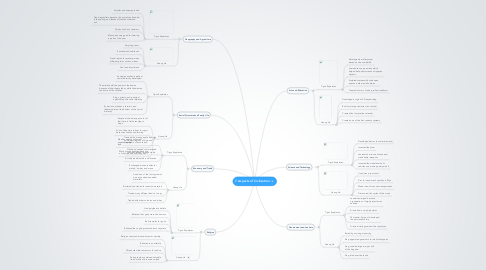
1. Social Structure and Family Life
1.1. Tigris Euphrates
1.1.1. As trade enriched a distinct social hierarchy developed
1.1.2. The males held the power of the homes because of their heavy labor, while the women took care of the children
1.1.3. Kings, priests, and principal agents atop the social hierachy
1.1.4. Sumerians, artisisans, farmers, and laborers were at the bottom of the social hierachy
1.2. Huang He
1.2.1. People of the time spent a lot of their time in fields tending to crops
1.2.2. A lot of free time to hunt for sport because of advanced farming
1.2.3. Wealthy people collected expensive objects of bronze and jade
1.2.4. Much more advanced because of the free time that they had
2. Economy and Trade
2.1. Tigris Euphrates
2.1.1. Traded with many people from the southwest regions of Asia and beyond
2.1.2. Obtained needed raw materials that they lacked through trade
2.1.3. A trade would enrich a civilization
2.1.4. Exchanged woven textiles for metals, timber, and stone
2.2. Huang He
2.2.1. Used one of the first system of money to obtain needed materials
2.2.2. Bartered and traded for needed materials
2.2.3. Traded many different kinds of crops
2.2.4. Traded with other colonies and tribes
3. Religion
3.1. Tigris Euphrates
3.1.1. Had polytheistic beliefs
3.1.2. Believed that gods were like humans
3.1.3. Built temples for gods
3.1.4. Believed that a god protected each city-state
3.2. Huang He
3.2.1. Religion centered around ancestor worship
3.2.2. Believed in an afterlife
3.2.3. Often asked their ancestors for advice
3.2.4. Shang tombs contained valuable items made of bronze and jade
4. Geography and Agriculture
4.1. Tigris Euphrates
4.1.1. Very flat and swampy lands
4.1.2. Good agriculture because the river often flooded in the spring, and leaves silt that enriches the soil
4.1.3. Very hot and dry summers
4.1.4. Most parts very good for farming in parts of the year
4.2. Huang He
4.2.1. Very long rivers
4.2.2. Enriched and fertile soil
4.2.3. Good region for growing many different grains such as wheat
4.2.4. Cool and dry climate
5. Arts and Education
5.1. Tigris Euphrates
5.1.1. Developed a math system based on the number 60
5.1.2. Learned to use geometry which helped build structures and irrigation systems
5.1.3. Sculpted statues with wide open eyes and other small objects
5.1.4. Created a form of writing called cuneiform
5.2. Huang He
5.2.1. Developed a style of Chinese writing
5.2.2. Built very large structures (ex. tombs)
5.2.3. Created the first precise calender
5.2.4. Created one of the first currency systems
6. Science and Technology
6.1. Tigris Euphrates
6.1.1. Developed basins to store rain water
6.1.2. Invented the plow
6.1.3. Learned how to use bronze and make better weapons
6.1.4. Invented the wheel and built vehicles and made pottery with it
6.2. Huang He
6.2.1. Used many irons tools
6.2.2. First to introduce chopsticks in Zhou
6.2.3. Made roads for easier transportation
6.2.4. Discovered the cycles of the moon
7. Government and Leaders
7.1. Tigris Euphrates
7.1.1. Leaders emerged because organization of large projects was needed
7.1.2. Priests had a very high status
7.1.3. The leader, Sargon I developed the permanent army
7.1.4. Priests initially governed the city-states
7.2. Huang He
7.2.1. Ruled by a strong monarchy
7.2.2. King appointed governors to rule distant ports
7.2.3. King used his large army at will of the kingdom
7.2.4. King ruled over the lands
